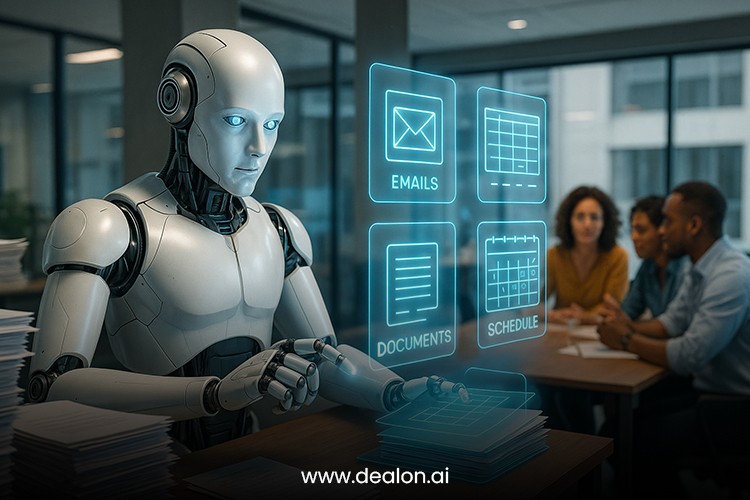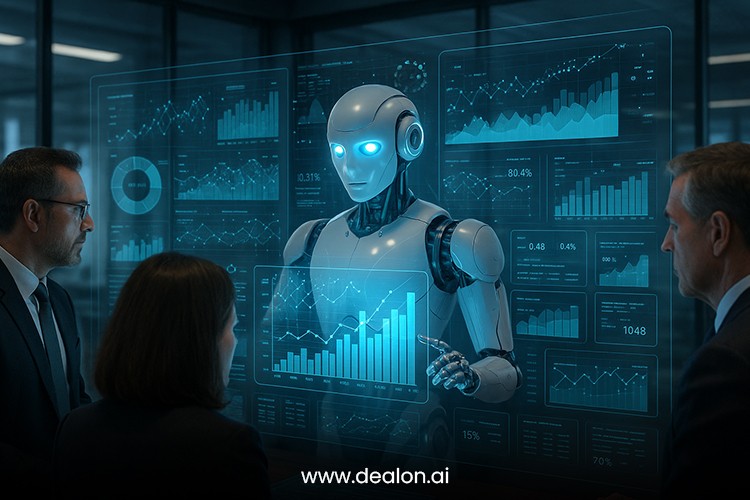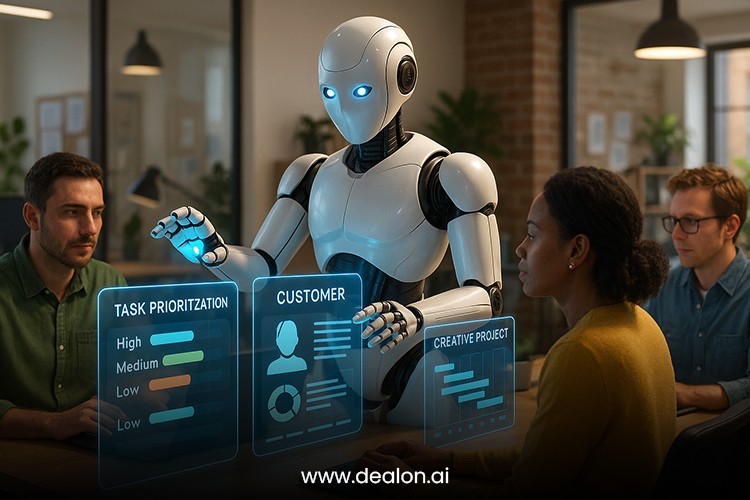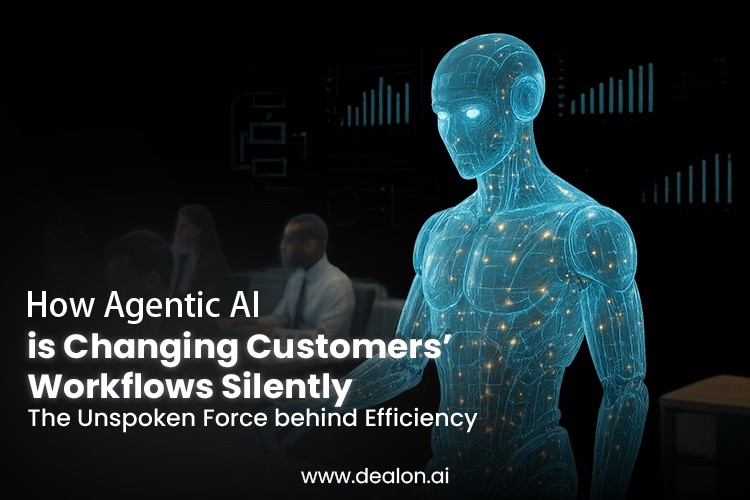Against a backdrop of the fast-paced environment of the contemporary business context, Agentic AI is softly coming out as one of the most disruptive forces that are transforming business operations in various industries. In contrast to more traditional artificial intelligence systems, which require human intervention to a significant degree, Agentic AI is meant to be autonomous and learns on its own with data, as well as form decisions with very little human input.
This dynamic ability can enable organizations to simplify operations as well as improve the process of decision-making and achieve unmatched efficiency in their daily operations. The concept of autonomous AI may seem a distant dream in the future. However, in practice, its applications are already producing significant shifts in various sectors, such as finance initially and healthcare subsequently, and marketing and customer service.
In its own terms, Agentic AI unites deep learning algorithms with the convoluted decision-making systems that enable it to assume the complex and repetitive tasks that humans traditionally handled. Using large volumes of data and constantly optimizing its activities, Agentic AI saves time that could be used to complete routine tasks and liberates human resources to work at a more advanced level and develop creative projects. This not only increases productivity but also creates a more innovative work atmosphere in which employees can use their expertise in other areas that require human perception and emotional intelligence.
Moreover, the power of Agentic AI is not only in the area of basic automation. It is radically transforming the way businesses make decisions and offers real-time information and predictive analytics that inform strategic decisions with a greater degree of accuracy. As organizations are slowly becoming conscious of what this technology can do, its integration into the daily operations is not merely a competitive strategy, but a necessity in the quest to attain real-time operation effectiveness and responsiveness in the ever-changing market. This post will discuss the role of Agentic AI in transforming workflows and why its silent power is turning out to be an essential part of the modern business ecosystem.
Also Read: 10 Steps to Automate Your Marketing Workflows Using AI
The Process of Automating Repetitive Processes: How Agentic AI Robots Outsource Mundane Work

Among the most profound transformations that Agentic AI is bringing to workflows is the automation of repetitive activities that consume time and usually slow down employees. Employees in the financial sector and even in the medical field are generally burdened with loads of administrative work routines- data entry, schedule management, report writing, and emails. These tasks are necessary but hardly demand the skills or tactics of a human being, yet they can absorb a lot of resources. The outsourcing of these duties to autonomous AI systems is seeing a radical transformation in the output and the involvement of employees.
Against its well-developed machine learning, agentic AI can easily cope with the dull chores with unprecedented efficiency. An example is in the customer service domain, where AI-powered chatbots have gone beyond being a query response system to more integrated, dialogue-based systems that can resolve complex customer problems on their own initiative. Such AI applications are based on the principle of natural language processing that helps them understand and respond to customer requests, providing them with direct answers to customer requests without human intervention. The result is a customer experience, which is immeasurably complemented and provides 24/7 24-hour human resource unlimited customer support.
This automation not only makes the delivery of services faster, but it also enables its employees to redirect their efforts to more intellectually demanding and high-impact tasks. As AI handles the repetitive part of work, employees have an opportunity to work on solving problems, in creative brainstorming, and strategic decision-making, where human judgment and innovativeness cannot be replaced.
Also, the ongoing learning abilities of Agentic AI make sure that with time, the automation will be more precise and perfect, changing according to the changing trends and improving performance all the time. In the end, this transformation in work ethic from task-oriented to value-driven work enhances a dynamic and productive workforce, which leads to employee satisfaction as well as business expansion.
Increasing the Quality of Decision-Making: The Benefit of Agentic AI in Making Smarter Choices

Among the most significant contributions of the Agentic AI to contemporary business, the capacity to enhance the decision-making process with the help of data-driven insights deserves mentioning. Human decision-makers are likely to be overwhelmed by large volumes of data in the era of data overload, as they may find it challenging to extrapolate valuable trends and patterns using a large amount of data. That is where Agentic AI comes in, which uses sophisticated machine learning algorithms to analyze vast volumes of data in a short amount of time and with accuracy. Identifying trends that humans could hardly notice, Agentic AI can provide the decision-maker with actionable information that can contribute to better decisions.
In the industry of financial services, e.g., AI is not solely a number-crunching machine but a life force that can forecast market trends through the use of large volumes of both past and present data. This will enable the investors and portfolio managers to make informed decisions in advance without having to monitor fluctuating markets all the time. Analyzing markets, economic factors, and geopolitics, Agentic AI can forecast the possible price changes, levels of risk, and investment opportunities, so it allows more intelligent financial planning and risk management.
Likewise, within supply chain management, Agentic AI is changing the manner in which companies are addressing demand planning and inventory control. AI can accurately forecast demand by analyzing sales statistics, demand trends, and external influences such as seasonality using its own capabilities. This allows businesses to minimize inventory, decrease overstock or stockouts, and refine procurement plans on a real-time basis. The output is a more responsive and agile business operation that can adapt quickly to changes in the market.
Personalizing Workflows: Agentic AI Personalizes Experiences to be Efficient

Customization of work processes by Agentic AI is reshaping how businesses are optimizing employee and customer productivity and efficiency. Analyzing the work habits of a particular person, his or her preferences, as well as the history of previous performance, AI can adjust the processes to the specific needs, improving the operations and increasing productivity. Imagine the use of project management platforms supplemented with Agentic AI, which can analyze previous project data, personal performance indicators, and team activity to offer the most effective course of action.
To illustrate, AI may also suggest the most appropriate course of action in a project, recommend the team members who will best fit in a given task, and tell when the bottlenecks will occur and prevent such events, facilitating the process for the customer. Such proactive strategies allow managers to focus on high-level planning, while AI handles the day-to-day complexities, ensuring that customer needs are met promptly.
Additionally, manipulating workflows according to personal work styles not only enhances the employee experience but also contributes to better customer service. Employees can leverage their productivity habits by adjusting task priorities to work on the type of tasks they produce the best results on, allowing them to work more efficiently and respond faster to customer requests.
This personalized view spreads to the dynamic of teams within a collaborative setting where AI is capable of identifying patterns in group interaction, performance, and group work. It provides an understanding of how to improve the performance of both the individual and the team, which has direct advantages when it comes to dealing with customers. With this personalized solution, Agentic AI can create a workplace where the needs of both employees and customers are carefully addressed with precision, making the efforts of each team member more meaningful and valuable to the customer.
Revolutionizing Communication: The smooth collaboration allowed by agentic AI
Communication is the substance of effective collaboration that is typical of the modern world. Traditional means of communication, like emails, video-conferencing, or instant messaging, are obligatory but can be limited in the context of coordination that is natural and fluid. That is where Agentic AI is silently changing the world of communication, making a revolution in the way teams interrelate, share information, and collaborate both within the company and across borders.
AI robots, such as intelligent assistants used in scheduling, are simplifying meeting coordination, which is a vital activity in the modern, busy digital working life. These systems are not just the issue of finding available times but an intelligent way of calculating the preferences of the participants, differences in time zones, and the priorities of the meeting, and proposing the best slot to all the parties involved.
These AI assistants will help teams to spend more time on productive conversations and less on logistical challenges by removing the irritation of daily back-and-forth scheduling emails. Moreover, when reminding a client about upcoming meetings and deadlines automatically, Agentic AI will make sure that nothing is dropped along the way, which will help make the execution of some projects more organized and timely.
In international projects, when groups are usually located on various continents, the language barrier and misconceptions may become the most significant obstacles to the exchange of ideas. Nevertheless, AI-improved communication devices have risen to this challenge and have provided such features as real-time translation and transcriptions. This not only demolishes language barriers but also assists in effective communication when teams talk with utmost clarity.
Sentiment analysis provides another layer of value, facilitating managers to measure team morale or customer sentiment based on written or spoken communication with the aid of AI-driven sentiment analysis. Through analysis of tone, context, and language structures, Agentic AI can provide real-time feedback regarding a message that may be perceived as understood to offer prompt corrective suggestions where appropriate. Such innovative features make the interactions smoother and more effective even when a team consists of people who speak different languages or operate in various time zones.
The Enhancement of Customer Interactions: How Agentic AI is Reshaping Client Interviews
The necessity of personalised, efficient, and responsive client interaction has never been more critical in customer-facing industries. The agentic AI is profoundly changing the way companies relate with their customers by boosting their functionality in comprehending their preferences as well as anticipating behaviors and providing customized experiences, frequently in real-time.
Consider the e-commerce sector, in which AI-based recommendation engines have turned out to be a game-changer. Examining your browsing history and buying trends, as well as preferences, Agentic AI can provide concrete product suggestions, and the chances of conversion and customer satisfaction are high. The personalized shopping experiences give customers a sense of understanding and appreciation, making them loyal and creating a long-term relationship.
Chatbots and virtual AI assistants are capable of dealing with customer questions in real-time and providing 24/7 support. Finding answers to product queries, helping with returns, and troubleshooting, these AI applications make sure that clients can always get prompt responses, which is essential in the busy digital world today.
The banking and other finance industries are also enhancing their interactions with customers using agentic AI. The analysis of huge data can forecast the needs of customers, providing proactive recommendations like proposals to invest in certain areas using past data or a financial plan in AI. AI can also be used in insurance to simplify the work of claims processing by interpreting documents with natural language processing and classifying claims. Agents. The automation of these processes permits businesses to provide better services, faster responsiveness to customers, and eventually establish closer relationships with them thanks to Agentic AI.
Future of Agentic AI: What Will You Do with Workflow Automation Next?
In the future, the future of the Agentic AI looks bright and has more possibilities for changing the workflow further. With the development of AI technology, it will be possible to expect even more complicated and sophisticated methods and processes that previously only human specialists could perform.
Autonomous decision-making is the most promising field of Agentic AI. In legal procedures, human resources management, and many other areas, AI is taking the shape of handling more meticulous decisions, which were previously left to human judgment. In legal departments, e.g., AI systems can independently analyze contracts, risk-assess, and will be able to provide legal advice depending on a vast amount of case law and regulations. In addition to accelerating legal tasks, it will minimize human error, which will eventually enhance the efficacy and cost-effectiveness of the legal departments in the industry.
Due to the further development of natural language processing and machine learning algorithms, Agentic AI will also be improved at the tasks that demand understanding and interpretation of the context, e.g., writing papers or generating marketing materials. This will result in more innovative automation in other fields, such as in the marketing sector, where AI can automatically produce personalized campaigning, anticipate consumer behavior, and optimize ad spend on the fly.
In addition, the combination of Agentic AI with IoT (Internet of Things) devices will advance the process of automating the workflow even more, establishing innovative environments that quietly coexist in the background. Within an office environment, e.g., AI systems would be able to automatically regulate the temperature levels depending on how the team prefers, track equipment use, and even control power. Such developments will lead to more sustainable, efficient, and comfortable workplaces, as AI will not only serve to streamline the working process; it will improve the overall experience of the office.
In such a way, the future of Agentic AI is collaborative with human intelligence, which enhances human choice and innovativeness. Performing routine tasks, generating information-driven insights, and offering personalized experiences, Agentic AI will keep influencing the future of work and will make businesses more agile, efficient, and capable of active operation in the rapidly evolving digital environment. Integrating Agentic AI into business processes is not a fad–it is a new step in the evolution of workflow automation.
Conclusion
The field of agentic AI is significantly transforming the practice of business, making it efficient, stronger in decision-making, and changing communication and interactions with customers. In regions with repetitive processes, automation can be used to personalize workflows and enable the removal of any hindrances to seamless collaboration by the team, thereby allowing them to concentrate on higher-value and more creative activities.
The predictive behavior, enhanced customer interaction, and optimization of processes of AI are already having a remarkable effect across industries. The more that AI develops, the more its ability to handle more demanding tasks independently will grow, and a new era of business agility, responsiveness, and innovation will emerge. It is necessary to adopt Agentic AI to remain competitive in the contemporary digital environment.

